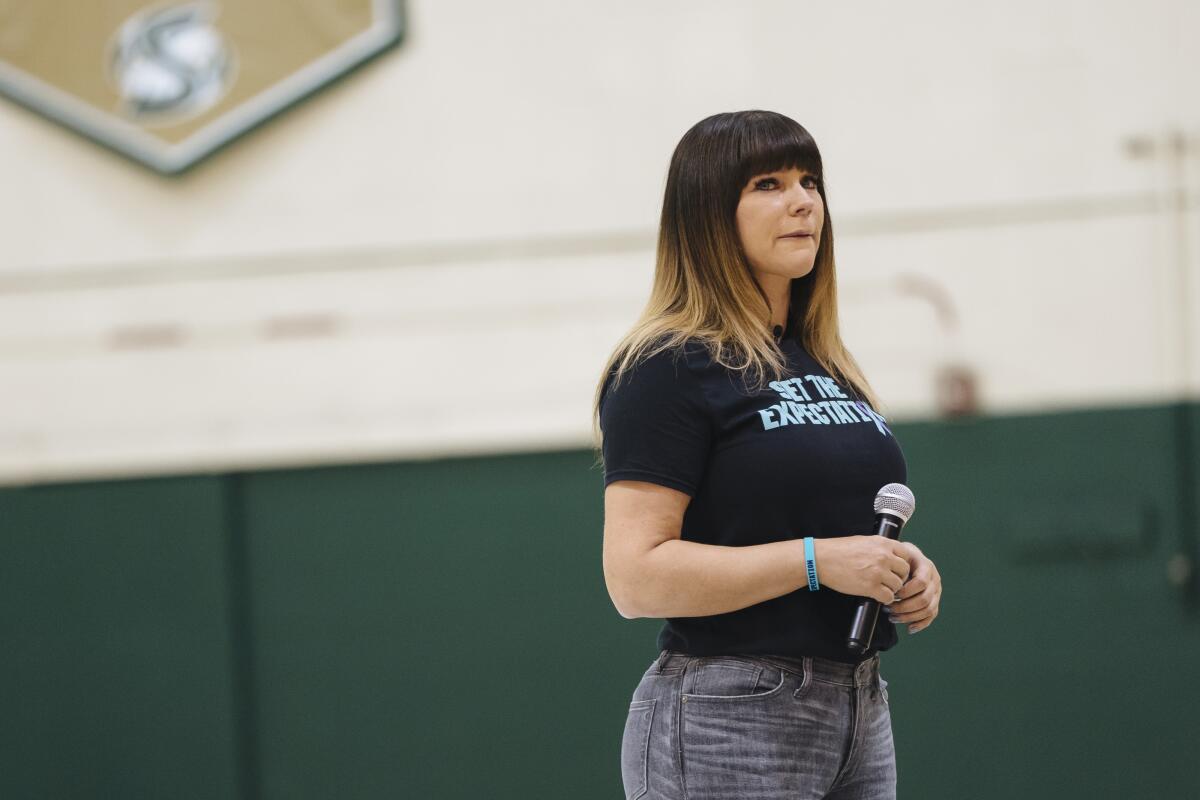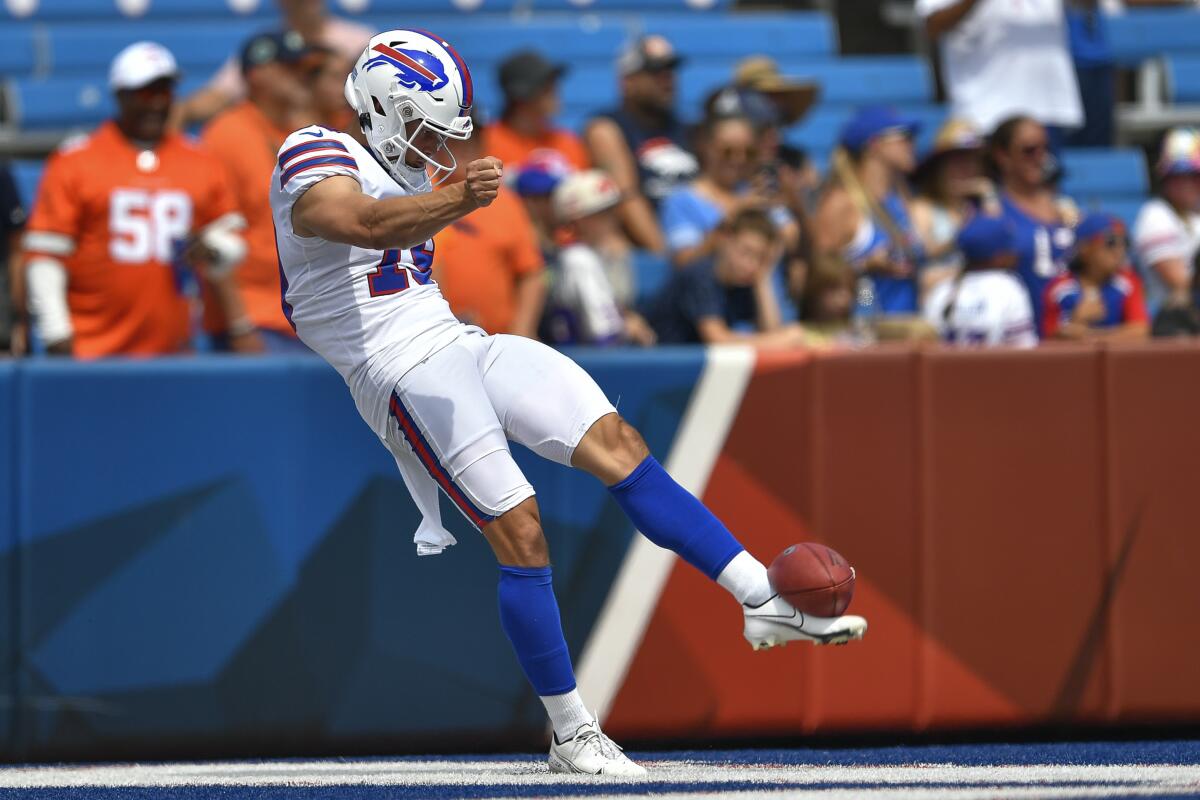As rumors spread of gang rape, SDSU turned to a rape survivor to address football team

- Share via
SAN DIEGO — After San Diego State University officials learned that police were investigating an alleged off-campus sexual assault involving several football players, a high-ranking athletic department official reached out to Brenda Tracy, a well-known sex assault survivor turned activist and public speaker.
Jenny Bramer, an SDSU executive associate athletic director, wanted to know if Tracy, a survivor of a gang rape involving college football players, could come to the university and give her presentation to “a few populations.”
Update:
11:48 a.m. Aug. 29, 2022This story has been updated with information from a statement from Brenda Tracy tweeted after the original publication of this story.
The first group on Bramer’s list: The Aztec football team.
This story is for subscribers
We offer subscribers exclusive access to our best journalism.
Thank you for your support.
Though it was not public knowledge at the time, a 17-year-old high school girl had accused five football players of raping her Oct. 16 at an off-campus Halloween house party. A lawsuit filed last week names three of the accused players, including Matt Araiza, an all-American punter who was drafted this year by the Buffalo Bills. He was benched Friday during the Bills’ final preseason game and then released from the team Saturday.

An attorney for Araiza denied the claims made against his client. “I 100% do not believe that Araiza raped this young lady,” Kerry Armstrong said Thursday.
In an interview earlier this month, Tracy told the Union-Tribune that when she came to speak to the university’s football team and coaches, she was unaware of the specific gang-rape allegations.
But “when I was on campus, I was told there was something going on,” she said.
In a lengthy statement provided by a university spokesperson, campus officials said Tracy’s visit was part of SDSU’s response to the allegations and aimed “to provide male sport student-athletes and coaches with education around sexual violence prevention and consent.”
The training sessions were mandatory, according to campus authorities.
“The university was doing what it could to reinforce expectations around conduct without undermining [the San Diego Police Department’s] investigation,” the statement read.
San Diego police were investigating the allegations at the time and had asked the university to stand down on opening its own inquiry. Police have since turned over the results of the investigation to the San Diego County district attorney’s office, which said this week it is still reviewing the case for potential criminal charges. The university did not launch its own investigation until earlier this month, deciding instead to heed the police department’s request.
Head football coach Brady Hoke was made aware of the criminal investigation around the same time SDSU’s athletic director and president were notified, according to school officials, who have said that notification happened Oct. 19. But Hoke said he wasn’t aware of the details and specific allegations until a June 3 story in the Los Angeles Times that broke the news of the alleged Halloween party incident.
According to The Times, at least one SDSU student-athlete mentioned Araiza in connection with the alleged rape in a message sent Oct. 26 through an anonymous campus reporting system. University officials did not answer questions about whether Hoke was told Araiza had been mentioned as being linked to the incident.
SDSU officials said they shared the information received through the anonymous reporting system with police, but detectives did not share information about their criminal investigation. “SDPD at that time had not — and has not to this day — confirmed for SDSU the names of any suspects in the criminal case,” the university said.
The civil suit alleges Araiza had sex with the intoxicated teen in a side yard of a College Area residence before bringing her into a bedroom where a group of men took turns raping her.
Football players Zavier Leonard and Nowlin “Pa’a” Ewaliko were also named in the lawsuit filed in San Diego Superior Court. Leonard, a redshirt freshman, was listed on the team website as the “co-starting left tackle” for the upcoming season, until being removed Saturday. Ewaliko has left the team and the university.
Ewaliko’s lawyer said in a statement that the filing of a civil action does not have any bearing on potential criminal charges and noted that no charges have been filed. An attorney for Leonard told The Times that the criminal investigation was ongoing and that as such, no conclusions about his client should be drawn.
Shortly after the alleged rape, rumors were swirling around the athletic department. According to The Times, one student-athlete sent a message Oct. 26 through an anonymous reporting system: “5 football players raped an unconscious girl at a football party two weeks ago.”
Bramer, the school’s Title IX deputy coordinator for athletics, reviewed the message and asked the anonymous tipster follow-up questions through the reporting system, according to The Times. That student-athlete, as well as another who reported the allegations anonymously, said rumors were spreading quickly among athletes at the university.
“99% of the football players are aware of the 5-person rape so the rest of the student-athletes are left wondering why nothing is being done,” the second student wrote, according to The Times.
The next week, on Nov. 5, Bramer emailed Tracy and her booking agent, copying SDSU Title IX Coordinator Gail Mendez and Danielle Kelly, an assistant athletic director and student-athlete development coordinator. The email offered no reasons for requesting Tracy’s services, but listed a pecking order of the groups Bramer was hoping Tracy would speak with:
- Football team
- Football coaches
- Remaining male student-athletes (basketball, baseball, golf, tennis, soccer)
- Female student-athletes
- Coaches and staff
- Nonstudent-athletes
Tracy told the Union-Tribune that Bramer’s request was not unusual. Tracy and her booking agent worked with Bramer to narrow the scope of her speaking engagement. According to the university statement, Tracy ended up giving two presentations at the school.
She spoke with the football team and its coaches Nov. 28, two days after the 25th ranked Aztecs beat Boise State in the regular season finale and as the team was preparing for its Dec. 4 Mountain West championship game, which it lost to Utah State.
She spoke Nov. 29 with the student-athletes and coaches from the university’s other men’s sports.
“These mandatory sessions were enhanced training sessions offered to reinforce the education and dialogue around the importance of maintaining a healthy and safe environment,” the university said Friday. “This was one of the many ways we looked to be active and proactive in response to the limited information we had, and that was consistent with SDPD’s request to stand down.”
Even though Tracy found out during her two-day visit that something was going on within the athletic department, she said she “didn’t get the impression I was being used for [public relations].”
Hoke told the Union-Tribune in July that Tracy’s presentation was “great.” Said Hoke: “I think the more education we can give, the more we move forward getting guys to understand and [grow] up.”
The coach said education on topics like sexual violence is “talked about from day one to all the way through.”
In its statement, the university said student-athletes begin receiving training as freshmen through a seminar course called “Aztecs Going Pro.” As freshmen, student-athletes receive 150 minutes of training over a three-week course provided by the Center for Community Solutions, a local rape crisis center, “which provides education and training with respect to relationship and sexual violence,” according to the university.
For sophomores, a two-week “ATHLETiquette” program for student-athletes reinforces and builds upon the earlier training, covering “various scenarios surrounding alcohol and other drugs and sexual violence that can exist on college campuses,” according to the university.
A spokesperson said the initial version of the “Aztecs Going Pro” program was launched in 2015. The seminar courses are not mandatory.
For Tracy, it’s not unusual to be brought in after some sort of alleged sexual impropriety has occurred. She said when university officials around the country bring her to their campuses to speak, more often than not — she estimated about 75% to 80% of the time — it’s because of a recent incident in the campus community.
“I wish that schools would be proactive in wanting to establish a culture of safety, transparency and accountability,” Tracy said. “Unfortunately, what usually happens is something happens on campus, and they call — it’s reactive.”
Tracy first shared the story of her gang rape in 2014 with the Oregonian. Late last year at SDSU, she shared those same intimate details of what happened to her in 1998, when she was 24 years old and attacked by four football players, including two who played for Oregon State University.
Tracy says she went to hang out with friends on a summer night, but ended up being gang raped, sodomized and robbed. She told investigators her attackers stood around, watching it happen and cheering the others on.
The two Oregon State football players who were involved were each suspended for one game. The Benton County district attorney’s office, despite having what appeared to be strong evidence and incriminating statements from the four suspects, declined to charge them. At the time, Tracy did not want to cooperate with investigators and prosecutors — she wanted to kill herself, she later told the Oregonian.
Tracy credits the emergency room nurse who conducted her rape-kit exam with changing her life and inspiring her to become a nurse. After going public with her story, she founded the nonprofit Set the Expectation. She now visits college campuses across the country to share her message: “Set the expectation that sexual assault and physical violence are never OK.”
According to Tracy, she shared the same message at SDSU that she always does: That 98% of sexual violence is committed by men; that 10% of men are the ones who commit such acts, leaving the other 90% of men responsible to speak up, especially in a tightknit community like a football team.
“I tell them silence is complicity,” Tracy said. “To the 90%t, I ask, ‘What is your role on this team, in this athletic department?’ It’s holding perpetrators accountable.”
Tracy said she teaches coaches and players that they have a choice: Be part of the solution, or part of the problem. She remembers having a “robust discussion” and “really good conversations” with the Aztec football team and coaches. She said she was “given more time than usual” with the football team, and went over topics including consent and victim blaming.
Tracy said she does not recall anything that occurred during her visit that makes her think differently about those sessions now that the allegations have become public. She acknowledged that it’s likely she spoke with at least some of the players accused in the alleged rape at the Halloween party.
“Being a gang-rape survivor myself, I’m kind of glad I didn’t know [the specific allegations] at the time,” Tracy said, adding she hoped such a sentiment didn’t sound cruel or insensitive to the victim. “Many things are triggering ... had I known that specifically, it would have been difficult for me.”
Even if she had known, “it doesn’t change my message,” Tracy said. And she said she felt Bramer and other athletic department staff “really wanted to help.”
Tracy sent a pair of tweets about her visit on Dec. 2. In one, she shared a photo of herself with nearly 100 football players and coaches, writing: “For almost 2 hours these guys were locked in as I shared my story & we went over topics that included victim blaming & false reports. Thank you for your time & attention San Diego State Football.”
More to Read
Sign up for Essential California
The most important California stories and recommendations in your inbox every morning.
You may occasionally receive promotional content from the Los Angeles Times.











